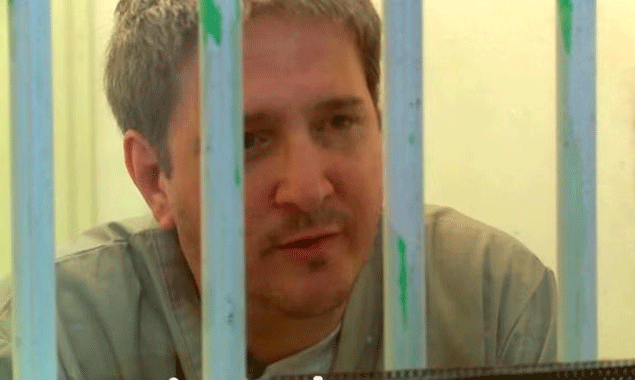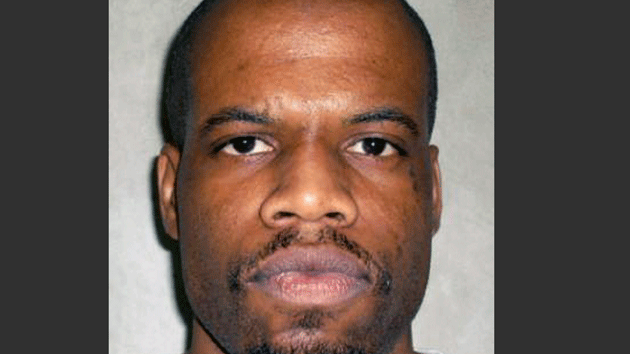
Richard Glossip is scheduled to be executed in Oklahoma Wednesday.<a href="http://www.richardeglossip.com/home.html">RichardGlossip.com</a>
Update, 9/16/15, 1:15 p.m.: The Oklahoma Court of Criminal Appeals today issued a stay of execution for Richard Glossip so it could consider new evidence submitted last night by his lawyers. Glossip’s execution date has been moved to September 30. The court’s order can be found here.
In June, the US Supreme Court cleared the way for Oklahoma to execute Richard Glossip—who has been sitting on death row since 1998, when he was convicted of first-degree murder—using a controversial drug that’s been implicated in several botched executions. Barring a last-minute stay by Gov. Mary Fallin, the state plans to put him to death on Wednesday. But if it does, it may execute an innocent man.
Glossip’s landmark Supreme Court petition challenging the method of his execution is a footnote to a larger story that highlights the death penalty’s many flaws.
Here’s the backstory: In 1997, Glossip was working at the Best Budget Motel in Oklahoma City, when the body of his boss, motel owner Barry Van Treese, was discovered in Room 102. Within a week of finding the body, the police arrested Justin Sneed, a 19-year-old handyman and meth addict who worked at the motel. Sneed confessed to beating Van Treese to death with a baseball bat. His DNA was all over the crime scene, and his fingerprints were found on a soda cup in Van Treese’s car. But egged on by police officers who promised him he could avoid a death sentence, Sneed claimed that Glossip had hired him to kill their boss.
No physical evidence linked Glossip to the crime. (Prosecutors tried to combat this problem by suggesting that the lack of Glossip’s fingerprints at the crime scene was actually evidence of his guilt.) In exchange for testifying against Glossip, Sneed received a life sentence. Meanwhile, a jury sentenced Glossip to death based entirely on Sneed’s testimony and prosecutors’ contention that he had wielded undue influence over Sneed, whom they described as a hapless dupe. An Oklahoma appeals court overturned the verdict, finding Glossip’s lawyer incompetent and the evidence against him strikingly weak. A second trial was held in 2004. Before it started, prosecutors offered Glossip a deal: Plead guilty to second-degree murder and receive a life sentence with the possibility of parole after 20 years. Glossip, who had no prior criminal record, refused, maintaining his innocence.
The second jury also found him guilty and once again sentenced him to death. That verdict was upheld. In both trials, Sneed’s testimony was inconsistent, changing considerably from what he’d initially told the police in 1997. Transcripts of the police interview with Sneed show officers coaching him to implicate Gossip, but video of the interrogation wasn’t screened at either trial—a fact that led the first verdict to be overturned, but not the second.
It’s not unconstitutional to execute someone who didn’t commit murder. Hiring someone else to do the dirty work, or conspiring with someone else to kill for money, is grounds for the death penalty, so long as there’s proof of that person’s “intent to kill.” In 2010, for instance, Virginia executed Theresa Lewis for hiring hit men to kill her husband and adult stepson, while the killers themselves got life without parole. But even under that standard, Glossip’s death sentence is a stretch. Prosecutors went to great lengths to suggest that Glossip wanted to kill his boss because he was going to get fired. But defense lawyers showed that Glossip had done a decent enough job at the motel that he’d received salary bonuses for 11 out of the prior 12 months before the murder. Prosecutors noted that when he was arrested, Glossip had about $1,200 in cash on him—evidence, they said, that Sneed had robbed Van Treese and split the money with Glossip. The defense countered that Glossip had just sold his belongings so he could get legal help after being questioned by the police. Indeed, Glossip was arrested coming out of a lawyer’s office.
The appeals in Glossip’s case have essentially run out, with the US Supreme Court turning down his last request for a rehearing on August 28. But over the past year, new developments have bolstered his claims of innocence. In October 2014, the Oklahoma Pardon and Parole Board denied a clemency petition from Glossip. The board then received an email claiming to be from Sneed’s daughter, saying she believed Glossip was innocent and that her father would likely recant his testimony if he could be sure he wouldn’t lose his plea agreement and end up on death row himself.
For a couple of years now, my father has been talking to me about recanting his original testimony. But [he] has been afraid to act upon it, in fear of being charged with the Death Penalty, and not be here for his children. My father has no reason to do so as a favor to Richard, as him and Mr. Glossip have no relationship and have had no communication in the last 17 years. I feel his conscious[sic] is getting to him. His fear of recanting, but guilt about not doing so, makes it obvious that information he is sitting on would exonerate Mr. Glossip.
The letter didn’t arrive in time, so the board never considered it, and Sneed’s daughter has never repeated the claim. Glossip’s lawyers say they have talked to her and she has said she now wants to support her father, who has denied wanting to recant his story.
The unusual circumstances of Glossip’s case and his rapidly approaching execution date have attracted international attention, including a sympathetic story in the National Enquirer. Dr. Phil devoted a show to Glossip in August featuring the actress Susan Sarandon, who publicly called on Oklahoma to spare his life, and Sister Helen Prejean, the nun Sarandon played in Dead Man Walking, who has also asked Oklahoma to spare Glossip. More than 200,000 people have signed online petitions supporting his clemency. Last week, Sir Richard Branson joined the chorus. So did former Oklahoma Sen. Tom Coburn (R), and legendary Oklahoma football coach Barry Switzer sent a letter to Gov. Fallin urging her to stay Glossip’s execution.
Last-ditch efforts to save potentially innocent condemned inmates haven’t fared well in the past. Most notably, the state of Texas executed Todd Willingham in 2004 despite a huge amount of evidence suggesting he had been wrongly convicted. Most death row exonerations have resulted from DNA testing. But the only DNA evidence in Glossip’s case implicates Sneed, the man who has already confessed to the crime. So a reprieve for Glossip is a long shot, especially in Oklahoma, where last year Fallin threatened to execute a pair of condemned men in defiance of her own state Supreme Court, which had issued a stay in their cases. When the judges refused to lift the stay, the GOP-controlled state Legislature threatened to start impeachment proceedings them. The judges caved, and the state went on to badly botch the execution of one of the inmates, Clayton Lockett, a debacle that prompted Glossip and his legal team to challenge Oklahoma’s lethal injection procedure—unsuccessfully—before the US Supreme Court.
Fallin shows no signs of wavering on Glossip’s fate. Earlier this month, a local Fox station reported that a juror from his first trial would have voted differently if some of the information that has recently come to light had been presented to the jury. In response to the story, a spokesman for Fallin said, “The fact that Glossip had one conviction overturned and was given a second trial illustrates that our justice system does respond to mistakes and has treated Glossip fairly. Governor Fallin believes in our justice system and is committed to upholding the law.”
Glossip’s legal team is frantically trying to save his life. But the options are limited.
Glossip’s Hail Mary for staving off execution in the federal courts was his failed petition to the Supreme Court earlier this year, in which his lawyers argued that executing him with the sedative midazolam, a component of Oklahoma’s lethal injection cocktail, would be unconstitutionally cruel. While the liberals on the court, led by Justice Stephen Breyer, used the case to make an impassioned argument for abolishing capital punishment, the conservatives held sway and ruled against Glossip.
As a result, much of the recent public pressure and lobbying has been aimed at Oklahoma’s governor. But Fallin only has the power to grant Glossip a 60-day stay of his execution, unless the parole board recommends clemency, which it hasn’t. His last best hope lies with the Oklahoma Court of Criminal Appeals, where Gossip’s lawyers will present last-minute new evidence on Tuesday that Sneed lied about Glossip’s involvement in the murder.
Much of that evidence hinges on the fact that Sneed was seriously addicted to methamphetamine, which he used intravenously. Sneed’s former drug dealer has signed an affidavit saying Sneed supported his habit by regularly stealing from the Best Budget Motel’s customers and breaking into their cars. The testimony is designed to change the government’s narrative to show that Sneed was a drug addict who killed Van Treese during a robbery gone awry, and that he simply tried to use Glossip to save himself.
If the Oklahoma court finds the evidence credible, it could stay Glossip’s execution until it can hold a hearing to probe the new information further. Glossip’s lawyers realize they have a high bar to meet, particularly in Oklahoma. “This is not a DNA-type case,” says Don Knight, one of Glossip’s attorneys. “This is a case of ‘he said, she said.’ It’s hard to refute that kind of a situation.”
Still, Glossip has been lucky before: He received a last-minute reprieve from execution in January, when the US Supreme Court decided to take up his lethal injection challenge. He’ll know by Wednesday whether he’ll get another chance to stave off the death chamber.
















